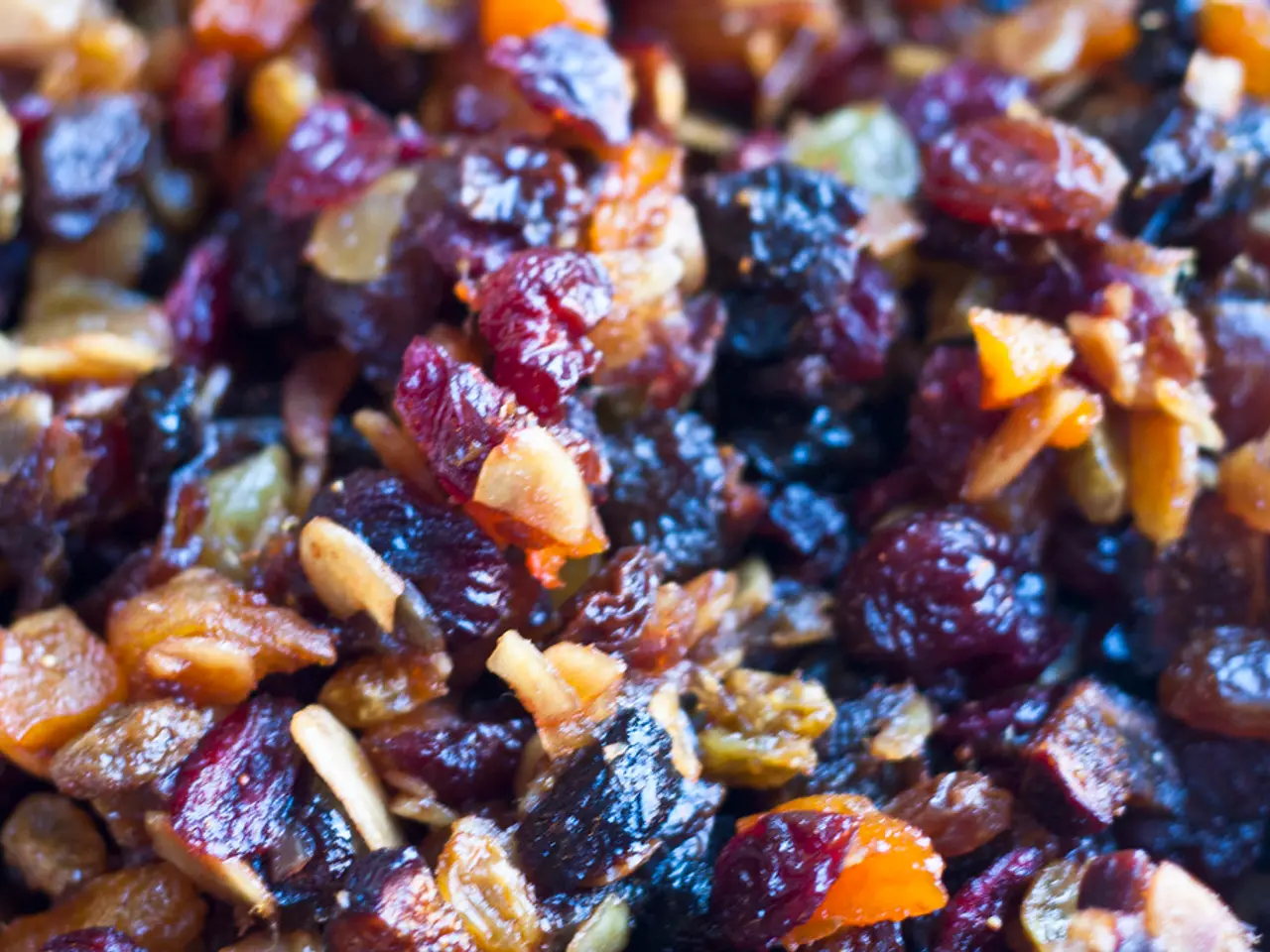Unprocessed or Minimally Processed Foods vs. Ultra-Processed Foods: Understanding Why the Latter is Harmful to Your Health
In today's fast-paced world, maintaining a balanced diet can be a challenge. Achieving this balance involves cooking at home, modifying recipes, and learning to take in less fat and sugar. However, it's essential to be mindful of the foods we consume, especially when it comes to ultra-processed foods.
Ultra-processed foods, such as chicken nuggets, frozen meals, hot dogs, packaged soups, potato chips, soft drinks, sweetened breakfast cereals, and more, have become a staple in many diets. These foods are altered to include fats, starches, sugars, salts, and hydrogenated oils extracted from other foods. They also have other substances like salt, sugar, fat, preservatives, and food dyes added to them for flavor and to make them shelf-stable.
The added sugar, fat, and salt in ultra-processed foods mean they have more calories than whole and minimally processed foods. Food manufacturers add these ingredients not only for shelf stability but also for flavor enhancement, making it harder to resist eating more of them.
Consuming ultra-processed foods compared to minimally processed foods is strongly linked to various negative health outcomes. These include increased risks of obesity, cardiovascular disease, type 2 diabetes, cancer, mental health disorders, and higher overall mortality.
Ultra-processed foods are typically high in added sugars, fats, salt, preservatives, and chemical additives, while being low in fiber and essential nutrients. Some key health implications include:
- Increased risk of chronic diseases: Studies show a direct association between ultra-processed food intake and higher risks of heart disease, cancer (including colorectal cancer), type 2 diabetes, and mortality from all causes.
- Obesity and metabolic disorders: Ultra-processed food consumption is linked to a significant increase in obesity rates and metabolic syndrome indicators.
- Mental health concerns: There is evidence relating high consumption of ultra-processed foods to increased prevalence of anxiety, depression, and other common mental disorders.
- Gut health and inflammation: Chemical additives in these foods may disrupt the gut microbiome by starving beneficial bacteria of fiber and damaging the intestinal lining, leading to chronic systemic inflammation.
- Difficulty with portion control: Ultra-processed foods often contain combinations of sugar, fat, and salt that make them highly palatable and potentially addictive, which can promote overconsumption and further displacement of nutrient-dense whole foods from the diet.
In contrast, minimally processed foods—such as fresh fruits, vegetables, whole grains, nuts, and unprocessed meats—tend to retain their natural nutrient profile, support a healthy gut microbiome, and are associated with lowered risks of chronic diseases and better metabolic health.
When grocery shopping, read nutrition and ingredient labels carefully and avoid common food additives and preservatives such as high-fructose corn syrup, BHA, BHT, carrageenan, food dyes, hydrogenated oils, MSG, potassium bromate, sodium nitrate and sodium nitrite, sulfites, and butylated hydroxyanisole (BHA) and butylated hydroxytoluene (BHT).
Start by making small swaps, adding more whole foods to your diet to balance out ultra-processed foods. Learning to make your own food can help avoid ultra-processed foods. You can even make healthier versions of favorite foods at home, such as sweet potato chips, nutty banana muffins, and oats and honey bread.
Remember, a balanced diet is achievable, and small changes can lead to significant improvements in your health. By focusing on choosing whole and minimally processed foods, you can reduce the risk of chronic diseases and promote overall health.
[1] Fung TT, Hu FB, Willett WC. Ultra-processed foods and added sugars: evidence and implications for diet, obesity, and chronic diseases. Am J Clin Nutr. 2016;103(4):1039–1049. doi:10.3945/ajcn.115.113663
[2] Monteiro CA, Cannon G, Rauber LA, et al. Nutrition transition, ultra-processed foods, and the pandemic of chronic diseases in Latin America. Public Health Nutr. 2015;18(17):2778–2784. doi:10.1017/S1368980015001876
[3] Schnabel R, Lautenschlager S, Bosy-Westphal A, et al. Ultra-processed food consumption and diet quality in the European Prospective Investigation into Cancer and Nutrition (EPIC) study. BMJ Open. 2017;7(12):e018157. doi:10.1136/bmjopen-2017-018157
[4] Lundh F, Björkhem-Bergman L, Bruzell E, et al. Ultra-processed food consumption and metabolic syndrome: a cross-sectional study in Sweden. Eur J Nutr. 2019;58(5):2151–2161. doi:10.1007/s00394-018-1794-4
- Maintaining a balanced diet, including whole and minimally processed foods such as fresh fruits, vegetables, whole grains, nuts, and unprocessed meats, can support a healthy gut microbiome, reduce the risk of chronic diseases, and promote overall health.
- In contrast, ultra-processed foods like chicken nuggets, frozen meals, hot dogs, packaged soups, potato chips, soft drinks, sweetened breakfast cereals, and more, are often high in added sugars, fats, salt, preservatives, and chemical additives, and low in fiber and essential nutrients, leading to increased risks of obesity, cardiovascular disease, type 2 diabetes, cancer, mental health disorders, and higher overall mortality.
- Achieving a balanced diet involves cooking at home, modifying recipes, and learning to take in less fat and sugar, and it's essential to be mindful of the foods we consume, especially when it comes to ultra-processed foods.
- When it comes to food shopping, reading nutrition and ingredient labels carefully and avoiding common food additives and preservatives like high-fructose corn syrup, BHA, BHT, carrageenan, food dyes, hydrogenated oils, MSG, potassium bromate, sodium nitrate and sodium nitrite, sulfites, and butylated hydroxyanisole (BHA) and butylated hydroxytoluene (BHT) can help maintain a balanced diet focused on health-and-wellness, fitness-and-exercise, and nutrition.
- By making small dietary swaps, such as trading ultra-processed foods for healthier alternatives like homemade sweet potato chips, nutty banana muffins, and oats and honey bread, and focusing on cooking and eating more whole and minimally processed foods, one can work towards a healthier lifestyle, food-and-drink choices, and overall well-being.




